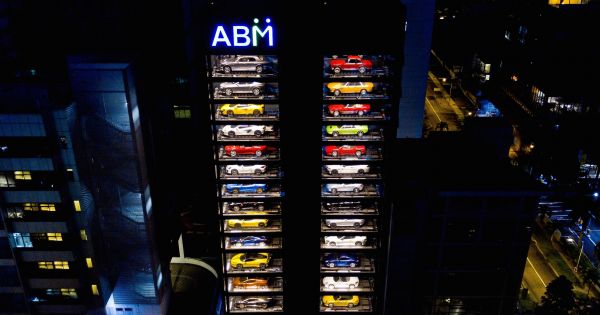
Domestic demand for luxury commodities is increasing in Russia, reads a report by the international auditing specialist Deloitte. The results of a survey conducted among well-heeled Russians indicate that 62 percent have started spending more on luxury items. A similar trend has been reported in both China and the UAE, described by experts as developing luxury markets. In Europe, the U.S., and Japan – which are all considered to be developed markets for luxury items – 49 percent have reportedly started shelling out more for deluxe items.
Darya Yadernaya, general manager at fashion consultancy Y Consulting, confirms that affluent customers are buying more in all categories of upmarket commodities, including apparel, footwear, and accessories. “The fact that the core of the deluxe shopping base is now more active on the market is compensating for the withdrawal of custom by middle-class buyers, which used to contribute around 30 percent to overall sales,” she said.
 A man stands in front of a luxury car dealership on March 9, 2017 in Moscow. / Photo: Getty Images
A man stands in front of a luxury car dealership on March 9, 2017 in Moscow. / Photo: Getty Images
Russians who are simultaneously paying off their mortgage and a car loan have stopped spending on luxury items as the ruble’s exchange rate has fallen, Yadernaya explains. “They simply cannot afford such buys anymore.”
Wealthy shoppers, for their part, have turned from buying abroad to spending more domestically. “At present, luxury items are more affordably priced in Russia than abroad, so shopping tours to foreign destinations make little sense,” Yadernaya explains. Accessories, primarily textiles, leather, and footwear continue to lead the sales.
Overall, Yadernaya estimates, luxury sales grew by eight percent in Russia as denominated in roubles. Experts expect the figure to reach 11 percent this year.
Interestingly, well-off buyers found the current crisis as a strong incentive to start spending more on luxury. “In these difficult times, many find it important to demonstrate that their business and life are just fine,” Yadernaya notes. “This approach results in increased conspicuous consumption; your lifestyle becomes much more important to you than it used to be.”
Those interested in maintaining their status reportedly spare no money on serious investment, going for private jets or yachts. “Private flying has become more widespread; many clients have switched from business class to own charter airplanes, and yacht sales have also gone up,” the expert points out.
This estimate is corroborated by the data provided by the Russian branch of Forbes Magazine. The publication has recently reported that around 350 yachts were sold worldwide in 2016, with a significant portion of those delivered to Russians. For example, Alisher Usmanov, the owner of mining company Metalloinvest, purchased a new 156-meter-long Dilbar yacht, whose price tag experts put at $600 million. Andrey Melnichenko, the owner of Siberian Coal Energy Company, bought a sailing yacht worth an estimated $400 million, while Dmitry Pumpyansky, the owner of steel pipe manufacturing leader TMK Group, got himself a 100-meter-long “Blade” boat for around $1.1 million.
 Alisher Usmanov’s motor yacht Dilbar. / Photo: Photoshot/Vostock-Photo
Alisher Usmanov’s motor yacht Dilbar. / Photo: Photoshot/Vostock-Photo
Russians are also actively buying luxury cars. The analytical agency Autostat reports that some 350 such vehicles were sold in Russia between January and March 2017 – 15.1 percent up year-on-year. Throughout 2016, the country’s luxury car market grew by 6.5 percent. Last year’s most popular model was the Mercedes Maybach S-Class (around 60 percent of all sales at 684 vehicles), followed by various Bentleys (318) and Rolls-Royces with 110 cars. The Maybach retained its leading position in 2017; it’s now followed in popularity by the new Maserati Levante crossover.
Bentley comes third, with 70 percent of the brand’s Russian sales falling to the Bentayga model. Georgy Aplevich, a news editor with AutoBusinessReview, comments that luxury cars have a more steady sales base than other vehicles: they are often purchased by senior managers of major corporations: “Maybach could be so popular because it is the least expensive luxury sedan, with the Bentley and Rolls-Royce makes coming with much heftier price tags. In addition, it is essentially a standard S-Class vehicle upgraded to the luxury level of the erstwhile Maybach. Many rich and famous people like this approach, because it allows them to stay relatively inconspicuous.”
https://www.rbth.com/business/2017/05/29/russians-beginning-to-spend-more-on-luxury-items_772090
On – 29 May, 2017 By Array







